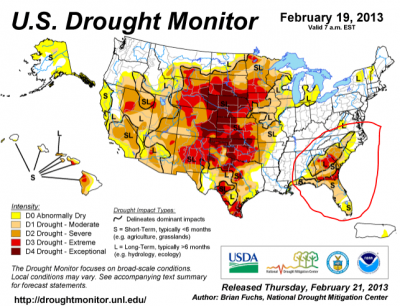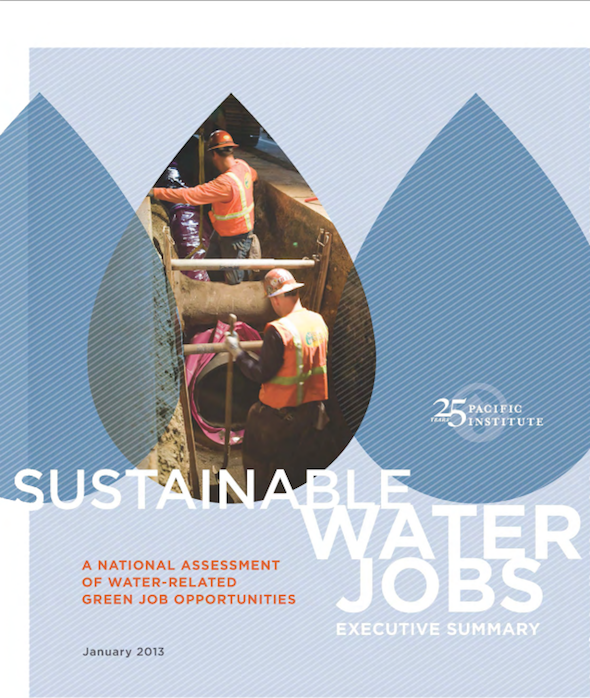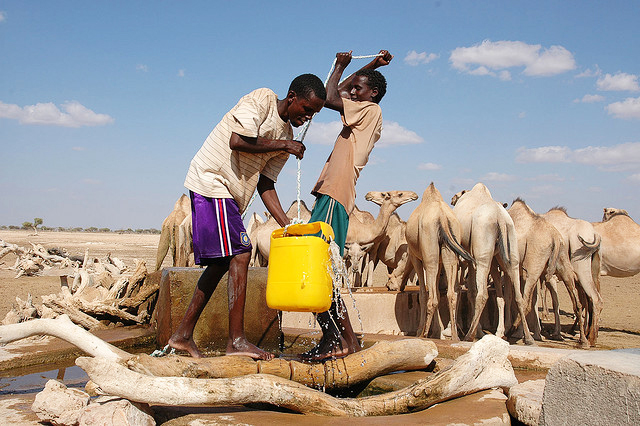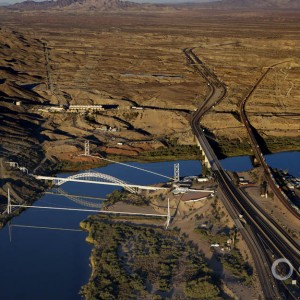Director of National Intelligence: Water Still a U.S. National Security Concern
The U.S. intelligence community reiterates that the basic necessities of life are a national security issue.
In his annual appearance before Congress, the director of national intelligence said once again that water, food and energy problems abroad, as well as climate change, deserve attention from the United States government. These natural resources and basic human needs can serve as rally points for terrorists groups and they can lead to instability in foreign governments and world markets.
“Environmental stresses are not just humanitarian issues,” James Clapper told the Senate Select Committee on Intelligence on Tuesday. “They legitimately threaten regional stability.”
Clapper’s testimony coincided with the release of the Worldwide Threat Assessment, an annual national security review from the Office of the Director of National Intelligence.
The assessment warns that floods, droughts, heat and disease will stress the global food system “in the immediate term” and that food prices could be volatile.
World leaders might not help the situation, the assessment argues, if they choose to ban exports, develop arable land, or lease land to foreign investors who will export the crop solely to their home country, such as some Persian Gulf states are looking to do.
Clapper has raised these issues since his nomination in 2010. His first report in February 2011 was the first threat assessment to include a separate section on water security (see sidebar). That section focused primarily on the potential for conflict in shared river basins.
Last year water drew even more attention when a comprehensive report on global water security, ordered by the State Department and prepared by the National Intelligence Council, followed the threat assessment. Former Secretary of State Hillary Clinton made water a priority during her stint as the top U.S. diplomat.
This year’s threat assessment covers many of the same water topics as the 2012 assessment. Food security, however, is a separate section for the first time. (It is usually lumped together with environmental security or in the country sections.)
The water section of the 2013 threat assessment is copied, in full, below:
Risks to freshwater supplies—due to shortages, poor quality, floods, and climate change—are growing. These forces will hinder the ability of key countries to produce food and generate energy, potentially undermining global food markets and hobbling economic growth. As a result of demographic and economic development pressures, North Africa, the Middle East, and South Asia face particular difficulty coping with water problems.
Lack of adequate water is a destabilizing factor in countries that do not have the management mechanisms, financial resources, or technical ability to solve their internal water problems. Some states are further stressed by heavy dependence on river water controlled by upstream nations with unresolved water-sharing issues. Wealthier developing countries probably will experience increasing water-related social disruptions, although they are capable of addressing water problems without risk of state failure.
Historically, water tensions have led to more water-sharing agreements than violent conflicts.
However, where water-sharing agreements are ignored, or when infrastructure development—for electric power generation or agriculture—is seen as a threat to water resources, states tend to exert leverage over their neighbors to preserve their water interests. This leverage has been applied in international forums and has included pressuring investors, nongovernmental organizations, and donor countries to support or halt water infrastructure projects. In addition, some nonstate terrorists or extremists will almost certainly target vulnerable water infrastructure to achieve their objectives and continue to use water-related grievances as recruitment and fundraising tools.
Many countries are using groundwater faster than aquifers can replenish in order to satisfy food demand. In the long term, without mitigation actions (drip irrigation, reduction of distortive electricity-for-water pump subsidies, access to new agricultural technology, and better food distribution networks), exhaustion of groundwater sources will cause food demand to be satisfied through increasingly stressed global markets.
Water shortages and pollution will also harm the economic performance of important US trading partners. Economic output will suffer if countries do not have sufficient clean water to generate electrical power or to maintain and expand manufacturing and resource extraction. In some countries, water shortages are already having an impact on power generation, and frequent droughts are undermining long-term plans to increase hydropower capacity. With climate change, these conditions will continue to deteriorate.
Brett writes about agriculture, energy, infrastructure, and the politics and economics of water in the United States. He also writes the Federal Water Tap, Circle of Blue’s weekly digest of U.S. government water news. He is the winner of two Society of Environmental Journalists reporting awards, one of the top honors in American environmental journalism: first place for explanatory reporting for a series on septic system pollution in the United States(2016) and third place for beat reporting in a small market (2014). He received the Sierra Club’s Distinguished Service Award in 2018. Brett lives in Seattle, where he hikes the mountains and bakes pies. Contact Brett Walton










Leave a Reply
Want to join the discussion?Feel free to contribute!